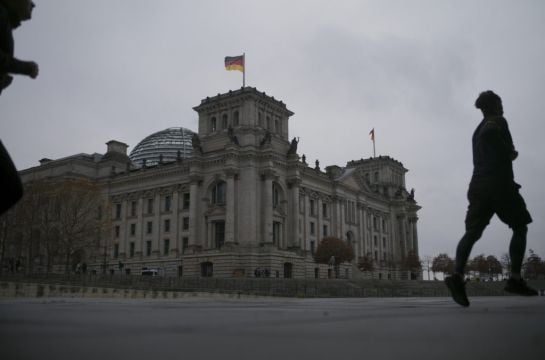Germany’s disease control agency reported 52,826 new coronavirus cases on Wednesday, stoking calls for fresh measures to curb steadily rising infection rates.
The Robert Koch Institute said 294 more people had died with Covid-19 in Germany since the previous day, bringing the country’s pandemic death toll to 98,274. The number of infections recorded since the start of the pandemic had reached almost 5.13 million.
“The current pandemic situation in Germany is dramatic, I can’t say it any other way,” outgoing chancellor Angela Merkel said.
“The fourth wave is hitting our country with full force.”

The three political parties negotiating to form Germany’s next government have agreed on a series of public health measures for parliament to debate on Thursday, German news agency dpa reported.
They include stricter workplace rules and sharply increasing the penalties for forging vaccine or test certificates to allow a maximum of five years imprisonment for professional gangs selling such fakes, according to dpa.
Employees would also get the right to work from home again, where possible.
Infections have shot up in recent weeks, particularly among unvaccinated people, with southern and eastern Germany the hardest hit.
The district of Meissen, near Dresden, reported almost 1,305 new cases per 100,000 inhabitants in the past week. Saxony state, where Meissen is located, plans to introduce new social distancing rules and to require people to show vaccine or recovery certificates to enter all stores except supermarkets and pharmacies.

Saxony has the lowest vaccination rate in Germany, with 57.6% of the population having had a full course compared to the national average of 67.7%.
German health minister Jens Spahn has called on doctors not to be too strict about waiting at least six months before giving patients their vaccine booster shots.
Mrs Merkel planned to meet on Thursday with the governors of Germany’s 16 states to co-ordinate the country’s response to the latest surge in infections.
“The meeting is overdue,” Mrs Merkel said, adding that she hoped officials would agree on a threshold for imposing additional measures that took into account how many people were hospitalised.
“It would be a disaster to act only when the intensive care units are full, because then it would be too late,” she said in a speech to mayors from across Germany.
Meanwhile, authorities in neighbouring Austria have said travellers will need to show a negative PCR test upon entering the country. Previously, results from the cheaper lateral flow tests were allowed.

The Alpine nation implemented a nationwide lockdown for unvaccinated people who had not recently had Covid-19 on Monday.
Elsewhere in Europe, the Czech Republic and Slovakia reported record daily numbers of new coronavirus cases on Wednesday, a day before the governments of the neighbouring nations plan to approve new restrictions in response to rising infections.
The Czech daily tally soared to 22,479 new cases, eclipsing the previous record set on January 7 by almost 5,000 and nearly 8,000 more than a week ago.
The country’s infection rate rose to 813 new cases per 100,000 residents over the past seven days, up from 558 a week earlier.
Czech prime minister Andrej Babis said the government was considering several options, including following neighbouring Austria in ordering a lockdown for unvaccinated residents.
Slovakia reported 8,342 new virus cases, surpassing the previous record of 7,244 set on Friday.
The Slovakian government is planning new restrictions on unvaccinated people as the country’s hospitals become overwhelmed with Covid-19 patients.
Slovakian prime minister Eduard Heger said his Cabinet would vote on Thursday on recommendations from an advisory group of medical experts.
And in Hungary, the number of daily Covid-19 deaths and new officially recorded cases on Wednesday climbed to highs not seen since a pandemic surge last spring.

Government figures showed 178 daily deaths and 10,265 new cases in the country of fewer than 10 million people. The latter figure approached record pandemic highs set in March, while daily deaths were the highest since May 1.
The numbers reflect a worsening pandemic situation in the Central European country, which in spring had the highest Covid-19 death rate per capita in the world.
In a further development, Sweden said it was introducing a digital Covid-19 vaccination certificate for public gatherings and events with more than 100 people indoors.
The move follows similar steps by other European Union countries amid the recent rise in cases.
“This is tough news to give. We all want the pandemic to be over,” social affairs minister Lena Hallengren said, adding that the certificate would be adopted from December 1.
Sweden has previously stood out among European nations for its comparatively hands-off response to the pandemic.
The introduction was “a measure we see as necessary in order not to burden the health care system”, Karin Tegmark Wisell, head of the Swedish Public Health Agency, said.
The Scandinavian country has officially recorded 15,107 deaths.







